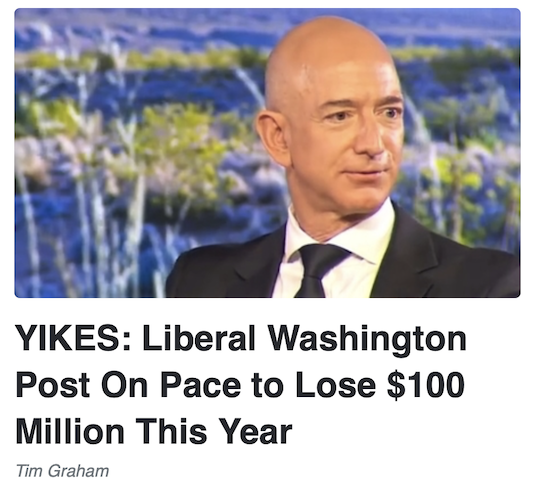Media Research Center executive Tim Graham was overly gleeful in a July 24 post:
The New York Times buried the lede in a story about Amazon billionaire Jeff Bezos owning The Washington Post. It isn’t quite profitable, you learn in the eighth paragraph: “The Post is on a pace to lose about $100 million in 2023, according to two people with knowledge of the company’s finances.”
The headline doesn’t include that eye-grabbing detail. It’s just this:
A Decade Ago, Jeff Bezos Bought a Newspaper. Now He’s Paying Attention to It Again.
The Amazon founder, who purchased The Washington Post for $250 million in 2013, has taken a more active role in the paper’s operations this year.
Yes, you can imagine he’d take a “more active role” with this nagging problem. Post employees were delighted a liberal billionaire bought the paper, so they didn’t have to be too worried about profits. “Prestige journalism” for the liberals isn’t working out right now, even as the paper extends its Trump obsession forward.
In his happiness that the Post is losing money, Graham is not going to mention that losing money has long been the norm for right-wing print journalism. As we’ve documented, the Washington Times, the Post’s perennial also-ran competitor in the city, received more than $2 billion in subsidies from the Unification Church to keep it alive since its founding in 1982, a flow disrupted only when the family of Rev. Sun Myung Moon cut off the spigot in 2010. The paper survives in a highly stripped-down form after being sold to a Unification Church front company a couple years later, and finally, in 2015, claimed to have its first-ever month of not losing money (though one can assume that was likely a blip and it has returned to its money-losing ways). Similarly, the right-wing New York Post has pretty much never made money — it exists due to subsidies from Rupert Murdoch’s other operations simply because he wants to be able to say he has a newspaper in New York (though it claimed to have made a profit, its first in modern history, in 2020).
It’s ironic that Graham is bashing the Washington Post for being dependent on a deep-pocketed owner who can absorb losses, when right-wing newspapers would have gone out of business years ago if they had to work within a free market and not rely on benevolent moneybags.
Still, Graham insisted on whining that “the Times still wants to imply that this financial problem isn’t a media-bias problem.” Of course, Graham offered no evidence that the Post’s alleged bias is solely responsible for the financial loss, and he completely ignored that newspapers across the country are losing money. He was again silent on the fact that the newspapers with the most pronounced right-wing bias have pretty much never made money. There is a “media-bias problem” — just not the one Graham wants you to think.
Graham is quite happy with newspapers dying, because their destruction has been an MRC agenda item for decades over their purported liberal bias, and he’s more than happy to see them be replaced with low-quality right-wing websites (even as the MRC rages against ratings firms like NewsGuard for pointing out that inconvenient fact).
